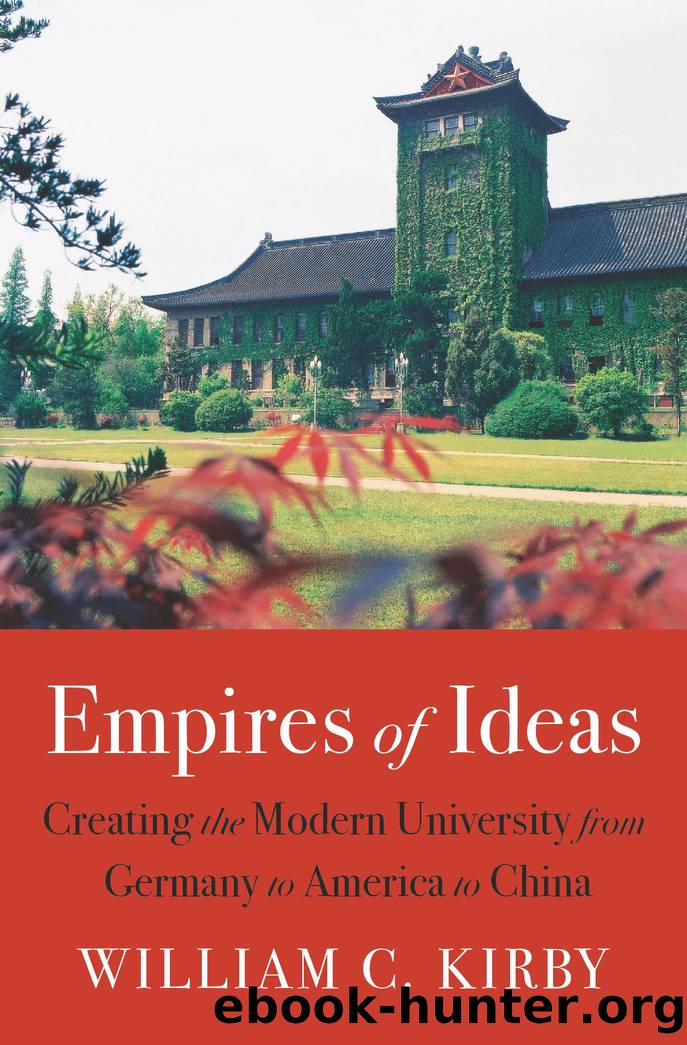Empires of Ideas by William C. Kirby

Author:William C. Kirby
Language: eng
Format: epub
Publisher: Harvard University Press
A Chinese Excellence Initiative
Growth in the higher education sector during the 1990s and the first decade of the 2000s was accompanied by the expansion and diversification of funding sources. By the end of this period, university funding came primarily from three sources: government, tuition fees, and commercial income.59 As philanthropic efforts gained traction in China, donations became an increasingly important source of university income as well. By 2008, 108 higher education institutions had established fundraising foundations.60
Funding from various strata of government accounted for the largest portion of the budget of many universities, although this proportion was decreasing. Continuing patterns of funding established in the 1950s and 1960s and renewed in the post-Mao era, the government tended to funnel resources to a few select institutions in order to foster centers of excellence.61 Funding for these elite universities came through two major government projects, the previously mentioned Project 211 and Project 985. Starting in 1995, Project 211 allocated approximately $2.2 billion to approximately one hundred top universities to support curricular and academic development within the disciplines as well as physical infrastructure. Universities applying for Project 211 funding submitted plans for how they would use the money to raise research and educational standards for consideration by the interministerial working group, which included leaders from the Ministry of Education (then the State Education Commission), the National Development and Reform Commission (then the State Planning Commission), and the Ministry of Finance. This working group assessed applications for Project 211 funding against the initiativeâs principles of âimproving the level of national higher education, accelerating the development of the national economy, promoting the development of science and technology, enhancing comprehensive national strength and international competitiveness, and realizing high-level talent cultivation in China.â62
Subsequently, the government launched Project 985 in 1998 at the centennial celebration of Peking University. Although structured similarly to Project 211, this project focused on allocating funding to a much smaller number of institutionsâinitially just two, later expanded to nineâbut provided them with much larger sums. Both Tsinghua and Peking Universities, the original two universities chosen to participate, received a total of $225 million in the projectâs first three years. In 2003 the research labs at Project 985-funded universities received nearly half of the annual research funds for higher education despite their universities enrolling only 1 percent of the total students in higher education.63 The initiative also gave birth to Chinaâs Ivy League equivalent, the âC9â group, which is composed of the nine universities that received early Project 985 funding.64 The government has since expanded the project to provide funding for a total of thirty-nine universities. Between 2015 and 2017 funding under Project 211 and Project 985 was replaced by the Double First Class Universities Program, with âDouble First Classâ (DFC) standing for âfirst-class universitiesâ and âfirst-class academic disciplines.â
Universitiesâ funding strategies were shaped also by the stateâs innovation and industrial policies. Since the higher education systemâs reestablishment, the state believed universities to be critical for fostering Chinaâs scientific and technological development. With the number of higher
Download
This site does not store any files on its server. We only index and link to content provided by other sites. Please contact the content providers to delete copyright contents if any and email us, we'll remove relevant links or contents immediately.
The Secret History by Donna Tartt(19096)
The Social Justice Warrior Handbook by Lisa De Pasquale(12191)
Thirteen Reasons Why by Jay Asher(8914)
This Is How You Lose Her by Junot Diaz(6890)
Weapons of Math Destruction by Cathy O'Neil(6282)
Zero to One by Peter Thiel(5804)
Beartown by Fredrik Backman(5759)
The Myth of the Strong Leader by Archie Brown(5510)
The Fire Next Time by James Baldwin(5450)
How Democracies Die by Steven Levitsky & Daniel Ziblatt(5221)
Promise Me, Dad by Joe Biden(5154)
Stone's Rules by Roger Stone(5088)
A Higher Loyalty: Truth, Lies, and Leadership by James Comey(4965)
100 Deadly Skills by Clint Emerson(4927)
Rise and Kill First by Ronen Bergman(4790)
Secrecy World by Jake Bernstein(4754)
The David Icke Guide to the Global Conspiracy (and how to end it) by David Icke(4720)
The Farm by Tom Rob Smith(4514)
The Doomsday Machine by Daniel Ellsberg(4491)
